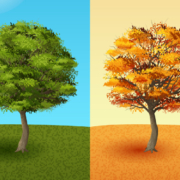Does the Weather Affect Your Fibromyalgia Symptoms?
(updated Dec. 2020)
Fibromyalgia patients often report that changes in the weather affects many of their symptoms. Many fibromyalgia sufferers feel that their symptoms vary according to temperature changes, changes in air pressure, and changes in precipitation. Most fibromyalgia sufferers claim that they experience “flares” when the weather changes.

They may experience a worsening of their fibro symptoms including –
- More pain
- Poor sleep
- Decreased moods
- Low energy
- Foggy thinking
Numerous studies have been conducted in order to evaluate whether or not fibromyalgia symptoms do appear to be influenced by changes in the weather. Most of these studies have had surprising results.
In 2002, a study was conducted in Cordoba, Argentina, where there are four distinct seasons every year. The study involved fibromyalgia sufferers and a healthy control group and aimed to find out whether pain symptoms could be linked to specific weather changes. Participants were asked to rate their pain symptoms on a scale from one to ten, every day for 12 months. After 12 months, these symptoms were correlated to weather patterns for the entire year.
Researchers found that pain symptoms of the participants with fibromyalgia correlated directly to weather changes. Specifically, pain increased as temperatures fell and atmospheric pressure increased. The healthy control group did not show any correlation between pain and weather patterns.
Another study performed in Norway found a similar relationship between fibromyalgia symptoms and the weather. Fibromyalgia symptoms appeared to get worse during the months of December and January, but began to improve during April and May. This suggests a direct relationship between colder temperatures and lower barometric pressures and a rise in fibromyalgia symptoms.
According to a study performed in 1981, a large percentage of fibromyalgia sufferers may actually be sensitive to changes in the weather. In this particular study, 90% of patients claimed that weather was one of the most important influences on their fibromyalgia symptoms.

Why Does Weather Affect Fibromyalgia Symptoms?
Unfortunately, researchers do not yet know why weather appears to affect fibromyalgia symptoms so much. However, here are a few possible explanations:
Change in Sleep Cycle: Weather, particularly hot and cold temperatures, can sometimes affect the way in which you sleep. This could have a great affect on symptoms and flares if you are a fibromyalgia sufferer.
Change in Circadian Rhythm: Your body operates using an internal clock known as the circadian rhythm. Changes in seasons and the amount of light that your body receives can throw off your circadian rhythm, causing you to feel fatigued and more achy then usual.
Pro-Inflammatory Cytokines: There does appear to be a relationship between low temperature levels and an increase in the number of pro-inflammatory cytokines in the body. These cytokines appear to be related to pain intensity.
Weather Factors That May Affect Fibromyalgia Sufferers?
 There are five major weather factors that appear to affect fibromyalgia symptoms. These include:
There are five major weather factors that appear to affect fibromyalgia symptoms. These include:
Changes in Temperature: Rapid changes in temperature can sometimes trigger a fibromyalgia flare or help to ease fibromyalgia pain. Cold weather tends to make fibromyalgia symptoms worse, while warmer weather tends to ease those troublesome symptoms.
The Barometric Pressure: Barometric pressure is a measurement of the weight that is exerted by the air all around us. On beautiful sunny days, barometric pressure tends to be quite high, but during a storm or similar weather front, barometric pressure drops suddenly. Fibromyalgia sufferers often find that these changes in barometric pressure can trigger muscle aches and pains.
Increased Humidity: Absolute humidity is a measurement of the amount of water vapor present in each unit of air. When absolute humidity is low, fibromyalgia sufferers often report stiffness, and flares in widespread pain.
Precipitation: Precipitation is the term used to refer to any type of water that falls to the ground from the sky, including rain, sleet, snow, or hail. Precipitation is often accompanied by a change in barometric pressure, and therefore may exacerbate your symptoms of pain and fatigue.
Wind: Whether it’s a light wind or a gale-force wind, wind generally causes a decrease in barometric pressure. This means that wind can trigger fatigue, headaches, and muscle aches in fibromyalgia sufferers.
Do you have flares when the weather changes? How does changes in temperature affect you? What about storm fronts? I find that my patients with fibromyalgia can lessen their weather flares by building up their stress coping savings account and stress coping glands with my Fibromyalgia Jump Start Program.
Staying hydrated, drinking plenty of water, getting a consistent good night’s sleep, and reducing your overall-stress are crucial for reducing future flares. Making time for prayer, meditation, or stress reducing reflection are important health enhancing daily routines and should be incorporated into your daily routine.





You said, Fibro patients are weird… I do better in the Winter.. I tolerate the cold much more than I do the heat.. However, from sunshine to storms bother me all year round.
While I don’t find weather to affect me nearly as bad as it used to, it still definitely does. The worst is when a storm front is on the way in and the atmospheric pressure is changing. Once the front arrives and the air stabilizes, typically so does my pain/fatigue. It’s the change that’s the worst. With that Spring and Fall tend to be the worst times in my part of the world (SE US) due to the increased risk of really bad weather.
The cold definitely does effect me, but it was 82 degrees yesterday, I turned the air conditioner on, I woke up today, & I can’t get out of bed! I am having a bad flare up in my ankles, & I can’t walk on my feet. Does anyone else have problems walking, or could this be something else?
AC lowers humidity, as it continuously removes the moisture in the same air being recirculated, so it keeps getting lower and lower. Most likely the stiffness is from the low humidity. To put this to test, run a humidifier with the AC, then AC without. AC is a migraine trigger for me, for both the coldness and low humidity factors.
I find the opposite to be true! My energy decreases and pain increases here in the Houston/Galveston Texas area. I believe the change is actually due to the level of humidity more than the temperature. If the heat and humidity are high, my body is totally depleted of energy.
During the fall, winter and spring, I am much better. I work full time in addition to being wife, mom, grandmother, pastor’s wife, friend, etc.
We entertain a lot for church in our home.
We are always busy doing something.
However, the summer humid heat chases me into the air conditioning and some days I just have 0 energy.
Why is that?
I also now have asthma (for the past 10 months) after years of increasing sensitivity to fragrances and chemicals.
My diagnosis is: Fibromyalgia, Chronic Fatigue, Sjogren’s Disease and the asthma, which is triggered by exposure.
I have fibro and have spent years looking for causes of symptoms, and what I can do to relieve my symptoms. Like many I thought that warmer whether may help alleviate my symptoms, and have been all over the country and the Carribean to find relief-and no where was really better than living in Michigan-with extreme whether changes and terrible winters. I am not sure there is a certain correlation between whether and symptoms-at least for my symptom expression-especially pain. While I understand pain can fluctuate with whether changes when one suffers from an inflammatory condition like arthritis, I don’t think inflammation is an issue with FM?
True, the pain triggered by changes in weather for those with arthritis is due to changes in bariatric pressure and joint swelling-fibro may or may not have inflammation and joint pain. The trigger for fibro is change period. Any additional stress, crowds, noise, mental or physical tasks as well changes in weather. Those with fibro and an underlying osteo or autoimmune arthritis will experience the biggest difference when the weather changes.
I have fibromyalgia for almost a year and a half finding that a dry hot climate in Arizona woked for me. I was very rarely in pain I was diagnosed with fibromyalgia and arthritis back in june of 2016.
I have been diagnosed with fibromyalgia and arthritis for almost a year and a half finding that a dry hot climate in Arizona worked well for me. Less pain, stiffness, ect…
I have felt pressure changes for 20 years and only good when pressure is high. My friends say I am a better weather reporter. High humidity over seventy percent increases my pain whether summer or winter. I hate late fall, winter and early spring. Pressure changes happen everywhere with any weather change. I just hate that the ain is consuming and I can not work anymore
I can totally agree with you on your comments. Good to know I’m not crazy.
The timing of this information is so helpful. I have Fibro and severe Osteoarthritis, plus many other things, and I am in British Columbia Canada. The weather has been very damp and hovering around freezing and I experienced so much pain in my spine and hips that I couldn’t walk for 8 days without much struggle and yelping from pain, and with the need for crutches. I was baffled by the severity of it. Then last Sunday morning I got up, stood up unaided, and walked like normal. I am aware that the changes in weather affect my arthritis, but having the extra charge of Fibro and its reaction to weather explains the severity of those 8 days. And to have it just go away overnight like that. Answer to my prayers or change in the weather (it did get colder and stopped being so damp), I don’t know, but am still enjoying being able to just get up and walk.
I live in the subtropics and when it rains for days on end I get bedridden. I am also extremely sensitive to the cold so although it doesn’t get freezing here, I still head north for winter (I’m in Australia)
Last year I got my symptoms under control quite well, particularly focusing on reducing inflammation. My sensitivity to the wet weather/low air pressure mostly went away.
My current hypothesis is that I’ve got increased cytokines due to chronic viral/bacterial or mycoplasma infections so I’m strategizing with my doctor on how to tackle that. If I can get the inflammation under control, I’ll be mostly symptom free after 10 big years of healing.
I have found that certain temperature changes more than 20° affect me. Humidity is a huge factor it makes me swell and that causes me a lot of pain. I’m definitely affected by barometric pressure. I do feel better in the winter time as long as temperatures are not super cold or frigid. Wind in the winter time causes me to get a headache but it doesn’t affect me add any other season.
I live in South Carolina. I fibromyalgia very badly here. I do not know why I am so affected by South Carolina weather, but I have terrible allergies here I suppose allergies can contribute to more pain from fibromyalgia but I don’t know. I went to Florida, September and October. I was there for about seven weeks I was pain for most of the time. as soon as I come back to South Carolina, I’ve got pain. My daughter says it’s possible that it’s stress from being in South Carolina. I don’t know about that either. I think it’s the barometric pressure the rain and now it’s cold because it’s winter it rains a lot here.